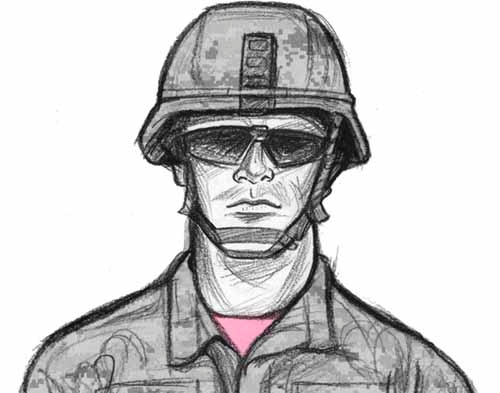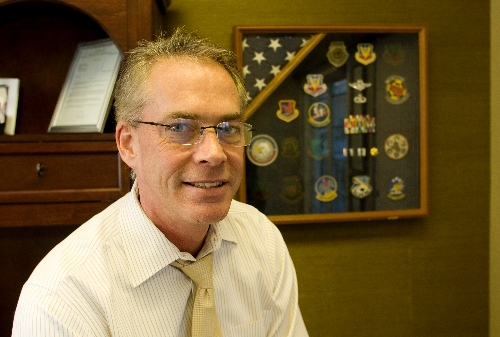Split lives over for gays, lesbians after repeal of “don’t ask, don’t tell”
History was made in December when the Senate voted to repeal the federal law banning gays and lesbians from serving openly in the U.S. military.
But when a unit of the Nevada Army National Guard held drills for the first time after the vote, troop chatter was more about the holidays than history, says a Guard soldier who was there. The soldier, a private first class, asked to remain anonymous because she is gay.
She recalls hearing only one person mention the "don't ask, don't tell" repeal and that was another lesbian soldier who expressed excitement that one day, she would not have to hide her sexuality or her girlfriend while she was on duty.
It's an open secret in their unit that both women are gay, the private says. And they aren't the only ones.
"It's no big deal," she says. The woman joined the Guard last year to serve her country while earning some money for college. The fact that gays and lesbians couldn't openly serve didn't factor into her decision. In fact, while she was in basic training, she confided in several fellow soldiers. It's hard not to when you spend so much time with them, she explains.
After 17 years of "don't ask, don't tell" and 14,000 careers cut short because of a service member's sexuality, is this what it's like to be gay and in the military in 2011?
Yes, the soldier says. Times and attitudes have changed. A lot.
During basic training last year, a fellow recruit freaked out and wanted to quit, she says. The recruit went to their commander, told him she was gay and that she wanted to leave. The commander's response? "Nobody cares about that anymore," the private recalls.
Polls taken in recent months have found that 70 percent of service members are fine with serving with someone who is gay or lesbian, says Paul DeMiglio , spokesman for the Servicemembers Legal Defense Network, an organization formed in 1993 to fight for the repeal of "don't ask, don't tell" and to advise active duty service members about the law.
The public also appears in favor of open military service; polls conducted by national news outlets leading up to the December vote showed that a majority of Americans wanted the law repealed.
And while gay and lesbian service members won't be able to serve openly until 60 days after officials certify the congressional vote, the final process is merely a formality for some.
"Personally, I don't think the repeal will change things much," says the Guard soldier. "I will still tell whoever I want, and I'll be cool with whoever I want to be cool with."
Though her attitude toward the repeal appears casual, the private says she, and her fellow soldiers, are aware of the years of work and the sacrifices made by gay veterans who have served their country despite knowing that they weren't wanted.
"I think the generation before us kind of led the way for this," she says.
Maja Gray is a veteran who came out as gay in 1998 while she was serving in the U.S. Coast Guard. She lost her 16-year career when she wrote a letter to her commander, revealing her sexuality.
"Everyone's always asked, 'Why did you do that?' " Gray says. "I just knew that I had to do it. I didn't want anyone else to have to go through it. It's a civil rights issue."
From the moment you join the military, as a gay person, you live a split life, Gray says. Friends outside of work cannot be mixed with military friends. Parties, promotions, celebrations, deployments, all of those are off limits to a gay service member's significant other.
"Most of my commanding officers knew I was gay, but it was one of those things no one talked about," Gray says. "As long as you were doing a good job, it was fine. But I think, what if I had gone to war and something happened to me? A whole part of my life would have been ignored."
A gay service member confided in retired Army Lt. Col. Pat Spearman about his partner, who went to war in Iraq but didn't come home.
"So when he got the news of the death, it was second or third hand," says Spearman, who is now pastor of Resurrection Faith Community church in North Las Vegas. She also is a gay veteran, serving from 1978 to 2005. "Their relationship wasn't recognized as legal, so he couldn't call the unit and get information. It was confirmed when he saw his partner's name and picture on the news. That's crazy. It's crazy."
The repeal will mean that, eventually, gay and lesbian service members won't have to live their lives in fear of being discovered. And they won't have to hide an important part of themselves, gay veterans say.
Jim Davis, a gay veteran and local attorney who retired in 2003 as a major after 20 years and two days in the military, says he never understood what his sexuality had to do with his service.
"It doesn't affect your job," Davis says. "When you're getting shot at, nobody cares. The first thing that goes through your mind is not whether the guy in the foxhole next to you is gay. You want them to show up and do their job well."
Some opponents of open service have an idea that the military will suddenly be flooded with gay and lesbian members, DeMiglio says. They don't realize that they're already there.
"If all the gay people in the military suddenly left, the military would come to a grinding halt," says John Cereso, a local attorney who was honorably discharged from the U.S. Air Force in 1990 for being gay. He served four years and planned to be a lifer, he says. But he had to come out when he was undergoing a top secret security clearance check.
Although "don't ask, don't tell" wasn't enacted until 1993, gays and lesbians were still banned from open service. Simply, the law meant that the military couldn't ask recruits directly about their sexuality. They could still be investigated if it was believed that someone was gay, DeMiglio says.
With an open service, apprehensions will eventually fade, Cereso says.
"I don't think military members will come out in droves. They're going to wait and see what happens," Cereso says. "There will have to be a bunch of success stories before people really feel comfortable. It's like turning the Titanic. It just takes time."
Contact reporter Sonya Padgett at spadgett@reviewjournal.com or 702-380-4564.


















